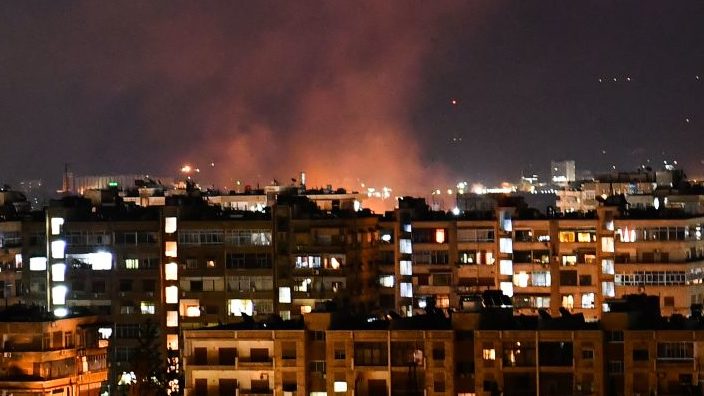Syria Suffers Airstrikes Blamed on Israel For 2nd Time in a Week
Muddled Middle Eastern arena unlikely to shift dramatically with changing US administrations
At least one person was killed and three more injured in an early Wednesday morning airstrike near the Syrian capital, Damascus, that was attributed to the Israel Air Force. It was the second such raid in less than a week, signaling a possible uptick in Israeli military activity in the region.
The Syrian State News Agency claimed that air defense batteries were triggered by the strikes and that they managed to push back a number of the airborne intruders. According to reports by Syrian opposition groups, the attack targeted weapons depots belonging to Hizbullah, the Iran-backed Lebanese terror group whose soldiers have in recent years supported Syrian President Bashar Assad in the country’s ongoing civil war.
These are tactical operations. When the opportunity and targets present themselves, Israel acts
On Friday, a similar strike said to be carried out by Israeli jets was reported by Syrian local news outlets. Several buildings were damaged in that raid, but no casualties were reported.
“These are tactical operations. When the opportunity and targets present themselves, Israel acts,” according to Prof. Eyal Zisser, vice rector of Tel Aviv University and an expert on Syria who formerly headed the Moshe Dayan Center for Middle Eastern and African Studies.
“Sure, there are times with less or more activity, but that depends on Iranian behavior there. I don’t see a significant change in policy with regard to Syria,” Zisser told The Media Line.
Israel has for the past few years conducted widespread preventive strikes on its eastern neighbor’s territory, targeting outposts, bases and arms caches belonging to Iran and its proxies, which Israel says pose a threat to its security.
Most of these incidents have not been acknowledged by Jerusalem, which has a policy of not commenting on such reports. Yet some have been confirmed by Israeli officials, with Prime Minister Binyamin Netanyahu claiming responsibility for one such attack in February 2019, saying Israel was “determined to act against Iranian aggression.”
Last week, the Israel Defense Forces Chief of General Staff Aviv Kochavi warned that if Iran or its partners attack Israel, “we will respond with force.”
Speculation has risen in recent weeks of a possible military operation to be carried out against Iran or its allies in the region by the United States, or by Israel with Washington’s blessing.
Hizbullah leader Hassan Nasrallah this week addressed a potential farewell gesture by outgoing US President Donald Trump before he leaves the White House, saying he was “worried” the “unstable” president might try to end his term with a bang.
“I don’t think Israel’s recent actions in Syria are connected to the changing administration,” Dr. Yehuda Blanga, a Syria expert in Bar-Ilan University’s Middle Eastern Studies Department, told The Media Line.
“We attacked there when [former President Barack] Obama was president and when Trump was in office and we’ll continue to do that when [President-elect Joe] Biden takes office in three weeks,” he said. “That shouldn’t affect Israel’s policy toward Iran, or Hizbullah-related activity in Syria in any way.”
I don’t believe Biden will drastically change much in terms of US presence or conduct toward Syria, either. The last two administrations essentially had the same policy of disengagement, albeit employing different methods
“I don’t believe Biden will drastically change much in terms of US presence or conduct toward Syria, either. The last two administrations essentially had the same policy of disengagement, albeit employing different methods,” Blanga said.
“So, that train has practically left the station – Russia is deeply imbedded there, so is Iran, and even China. It’s an arena that involves so many superpower forces that, on paper at least, it appears there’s not much room left for the US,” he added.
Zisser agrees that nothing is going to change for Syria in the near future. “Syria is stagnant, totally static. Iran isn’t dramatically changing its positioning because of Israeli attacks. Russia, Turkey, Hizbullah and Assad’s troops are all there for the foreseeable future,” he said. “It would appear nothing is going to change any time soon.”


